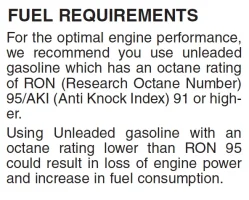Yes - the engine will adjust itself (i.e. adjust the timing) when 93 octane is used just as it adjusts itself when 87 octane is used.
You seem to be implying that the ECU has no fixed ceiling with regard to how it advances timing?
Are you saying that if you put racing gas in, the ECU would continue to advance timing until it hears knock?
I disagree. Most likely the engineers put a ceiling in. If so, the ECU will adjust up to that point.
If that ceiling point is the performance you get when 87 octane is used on a brand new car on a clear spring day at sea level with only the driver aboard, then going to 93 or 104 or whatever is meaningless.
On the other hand: If you use 87 on a carboned up high mile engine going up the mountain in Colorado on the hottest day of summer, fully loaded, then the ECU will pull back on timing until knock disappears. If you replace that 87 with 93 and continue up the mountain, the ECU will advance timing--up until knock appears or the programmed ceiling (if present) is hit, whichever comes first.
And nearly every study done (see, for example, the video I included a few posts ago) has shown that when a higher octane is "recommended" the engine involved makes more power with higher octane gas than it does with lower (but still acceptable) octane gas.
If the engine is designed that way, and if the car is sold that way, sure. That's what I said. Mazda is an example of that.
Are you telling me that's not true with Kia?
I'm saying I don't know if it's true. No one here has provided any documentation as such. Are you saying it's a fact that's how it is with Kia?
That Kia's engineers somehow figured out how to make an engine that makes the same horsepower regardless of whether the recommended fuel is used or a lower octane fuel is used?
you have it backwards. I said that Kia's engineers set the car up for 87 octane fuel, and that 93 octane fuel performs no differently (on a new/clean engine, sea level and flat, light load). In general, if they tell you "use 87" and make no mention of doing anything else, that's what they mean.
And like I said, Mazda says different. Mazda very specifically says that their system will take advantage of the higher octane fuel. What they mean is, "we tuned it/put the ceiling for 93 octane, but don't worry, using 87 won't hurt anything, we're absolutely controlling for that, we'll just back things down for you." Does Kia say anything like that?
Many VW owners claim that VW under-reports the specs on some of their engines. Some claim to have dyno numbers that show this. Whatever. VW has said nothing more than that their GTI puts out 228bhp on 87 octane. Like Kia, VW makes no commitments along the line of what Mazda says.
And since you didn't seem to read anything I wrote other than the post you quoted, if you look back you'll see that I agree with you - it's fine to use 87. I use 87. I don't know why you're being so unnecessarily confrontational.
Not my intention, sorry. If I read your earlier pieces, I've forgotten. I'll go back and take a look.
But really, I'm looking for something other than "I believe" when it comes to how a new Stinger behaves with different gasolines.





